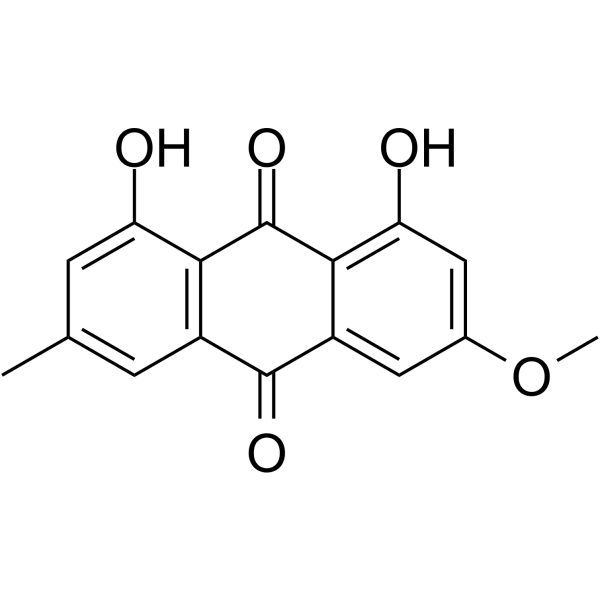天然产物醌类Quinones
Physcion (Synonyms: 大黄素甲醚; Parietin; Rheochrysidin) 纯度: 99.10%
Physcion (Parietin) 是从中药大黄中得到的蒽醌类物质,为 6-磷酸葡萄糖酸脱氢酶 (6-phosphogluconate dehydrogenase) 抑制剂,IC50 和 Kd 值分别为 38.5 μM 和 26.0 μM。Physcion (Parietin) 具有通便、保肝、抗炎、抗菌、抗增殖、抗肿瘤作用。

Physcion Chemical Structure
CAS No. : 521-61-9
| 规格 | 价格 | 是否有货 | 数量 |
|---|---|---|---|
| 10 mg | ¥500 | In-stock | |
| 25 mg | ¥1000 | In-stock | |
| 50 mg | ¥1750 | In-stock | |
| 100 mg | ¥3000 | In-stock | |
| 200 mg | 询价 | ||
| 500 mg | 询价 |
* Please select Quantity before adding items.
Physcion 相关产品
•相关化合物库:
- Natural Product Library Plus
- Bioactive Compound Library Plus
| 生物活性 |
Physcion (Parietin) is an anthraquinone isolated from traditional Chinese medicine Radix et Rhizoma Rhei, acts as an inhibitor of 6-phosphogluconate dehydrogenase, with an IC50 and a Kd of 38.5 μM and 26.0 μM, respectively[1][2]. Physcion (Parietin) exhibits laxative, hepatoprotective, anti-inflammatory, anti-microbial, anti-proliferative and anti-tumor effects[2]. |
IC50 & Target |
IC50: 38.5 μM (6-phosphogluconate dehydrogenase)[1] |
||||||||||||||
|---|---|---|---|---|---|---|---|---|---|---|---|---|---|---|---|---|---|
| 分子量 |
284.26 |
||||||||||||||||
| Formula |
C16H12O5 |
||||||||||||||||
| CAS 号 |
521-61-9 |
||||||||||||||||
| 中文名称 |
大黄素甲醚 |
||||||||||||||||
| 运输条件 |
Room temperature in continental US; may vary elsewhere. |
||||||||||||||||
| 储存方式 |
|
||||||||||||||||
| 溶解性数据 |
In Vitro:
THF : 2.5 mg/mL (8.79 mM; ultrasonic and warming and heat to 60°C) DMF : 1 mg/mL (3.52 mM; Need ultrasonic) Acetone : < 1 mg/mL (insoluble) Ethanol : < 1 mg/mL (insoluble) 配制储备液
*
请根据产品在不同溶剂中的溶解度选择合适的溶剂配制储备液;一旦配成溶液,请分装保存,避免反复冻融造成的产品失效。 |
||||||||||||||||
| 参考文献 |
|
